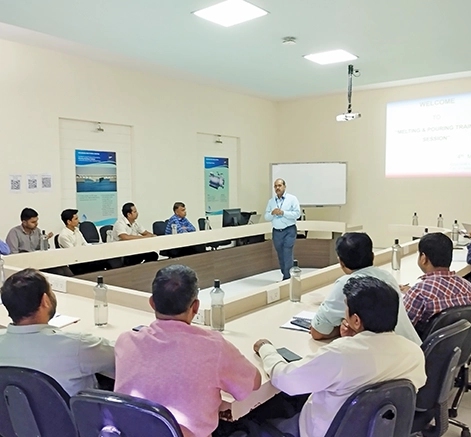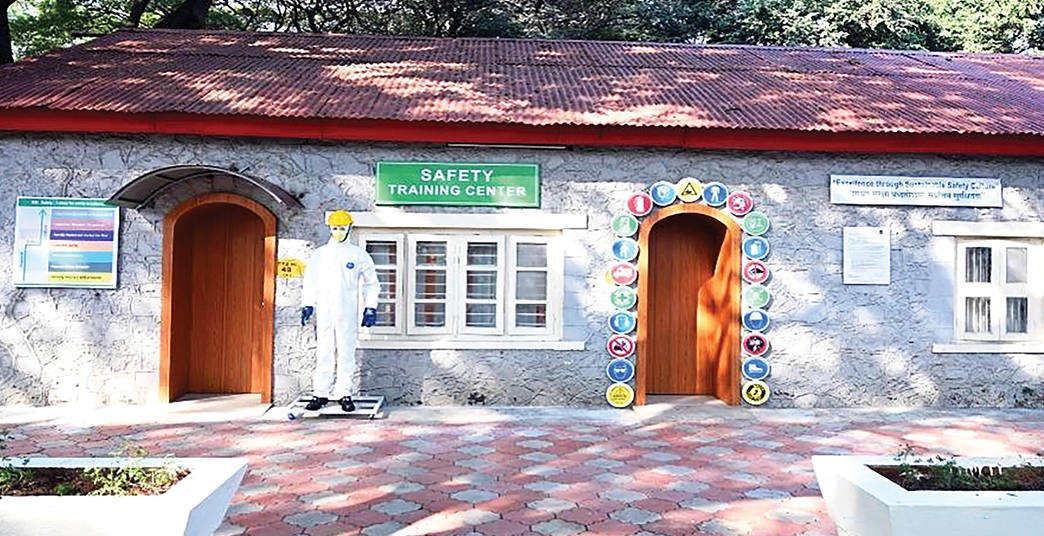KIRLOSKAR BROTHERS LIMITED
Established 1888 A Kirloskar Group Company

Total Number of Employees
No. of Male Employees
No. of Female Employees
Total Number of Workers
No. of Male Workers
No. of Female Workers
FY 2020-21
FY 2021-22
FY 2022-23
Differently-abled employees
Differently-abled workers
Women-operated facility at KBL Kaniyur Plant, Tamil Nadu
Women representation on Board
Women Workforce in Sanand Plant

Safety Training Center at Kirloskarvadi Plant
Our training and development policy is aimed at enhancing functional, professional and personal competencies, and also the individual skills. Training programmes are designed and implemented based on gap identified and performance appraisals. Training needs of employees are mapped and a training plan is designed and imparted accordingly. We have also set up training facilities at Kirloskarvadi and Kaniyur plants, with training equipment like model pumps, assembly tooling and attachments to impart training by hands-on job experience.
Our knowledge management team sets targets for the level of knowledge and skills required, with the goal to bridge the gap between current and desired performance and meet the business requirements. It creates a work environment that promotes creation, retention and use of knowledge. We anticipate future skill-needs and prepare our employees to handle more challenging tasks. Our career development policy, cross-functional projects and action learning projects are some ways used to develop enhancement of functional, professional and personal competencies and skills of our individuals.
Training is a continuous process and is important to enhance job knowledge. It is needed to improve awareness and understanding about our products, manufacturing and assembly processes, process checks, inspection, and testing requirements. Conceptualised as BODHI, we have dedicated facilities at Kirloskarvadi and Kaniyur plants and have created training module to impart practical and theoretical training.
Change control is an important element of safety management. With the pace of change today, it is almost certain that manufacturing plants will face the demand for change from time to time. It is important that each change is carefully evaluated and assessed from the perspective of EHS (Environment, Health, and Safety). Systematic evaluation of proposed changes is done through EHS change control system to minimise unintended safety, health, and environmental consequences. This is a proactive evaluation of EHS-related requirements for any change, and is done during the planning stage to minimise potential risks.
It is important to understand, study and implement the concept of TPM with proper guidance. At KBL, we have implemented Total Productive Maintenance with support from Japan Management Association Consultants (JMAC) and have witnessed encouraging results. The TPM Instructor Course is an onsite training course designed and conducted by the experienced and skilled JIPM-certified TPM consultants who perform consulting at factories around the world. This in-plant intensive course, conducted for KBL plants, including KEPL and KPML, helps in understanding and implementing TPM. The course duration of two weeks consists theory and application of TPM tools for all the 8 pillars, case studies, and presentations by the participants to the senior management.
As of now, we have conducted 5 of these instructor courses at Kirloskarvadi plant covering 130 employees and are planning the 6th course in July 2023 with 26 participants. This covers around 22% of our employees and key managers from all functions including Manufacturing, Foundry, Maintenance, ME+IE, Quality, Support Functions and Safety. Further, the certified TPM Instructors do Relay Teaching to other team members to spread awareness and knowledge about TPM, targeting to cover 100% of our people.
During the servicing and maintenance of machines and equipment, the unexpected start or release of stored energy can result in a serious kind of injury to the workmen. Energy sources including electrical, mechanical, hydraulic, pneumatic, chemical, thermal, or other sources of energy in machines and equipment, can be dangerous. A proper lockout/tagout (LOTO) system in machines can safeguard workmen from this sudden and unexpected release of energy. Machine-wise requirement of Lock-out Tag-out is identified and training is provided on the job to relevant employees on ways to carry out LOTO and make record keeping.
All organisations, big or small, discuss about “Quality”, and hence, we keep improving our products to deliver even better quality. In a business organisation, there is a need to understand the term “Quality” as a wholesome business process, which should be the backbone of all our decisions, communication, processes, deliberations and dealings. Every activity we do is a “cost” to the Company. Hence, to understand all activities in terms of cost is important to function as a wholesome organisation. We are working at scientifically addressing our problems on hand, eliminating its root cause and setting right the processes. Problem-solving through “Quality Prism” is an attempt to help every individual resolve roadblocks and achieve excellence.
The well-being of employees and their immediate family members is important for us. To illustrate, “KBL Well-being”, a health and lifestyle platform has been launched to focus on employees’ physical and mental health. Also, most of our sites are on 5-day work schedule. At plant sites too, we practice a policy of having an off-day on alternate Saturdays to help employees maintain work-life balance. A Sabbatical Leave policy (up to 6 months) is available for female employees to be utilised as extended maternity leave.
The crèche facility at our Kaniyur plant enables our employees to leave their children at the crèche, while they are at work and children are provided a stimulating environment for their holistic development. Effective implementation of the crèche facility helps us develop the morale of our female employees and also enable them to handle the safety aspect of their children.
The use of crèche facility is legally proposed to be extended to children of age group of 6 months to 6 years of all our employees, including temporary, daily wage, consultant and contractual personnel. However, for a single parent, we have abandoned the age limit for female child. The crèche is operated in shifts to respond to the needs of their parents and in the best interest of children. Around 16-18 children are currently availing the facility on a regular basis during school vacation. At the facility, the children are provided with healthy diet, and are also taught self-discipline by the care-taker.
Continuing our focus on talent development, we revised the Leadership Competency Framework to support our growth aspirations. The framework has specifically identified and defined leadership competencies for each level of management, and guides human resource development processes.
We assess the competencies for senior leadership through our Assessment & Development Centre. This provides valuable insights into our strengths, development areas and leadership potential, enabling targeted and personalised development plans.
The program has been strengthening our fabric by teaching young minds to continuously challenge the present and build a stronger and more agile company. It continues to create an energetic band of youthful engineers and make a visible difference in our progress.
The technical training division is focussed on developing a sustainable model for continuous development of employees’ technical competency. During FY 2022-23, we prioritised two areas “Pump Design” and “Foundry Technology” to begin with.
In association with Indo German Chambers of Commerce, we equipped shop supervisors and CNC machine operators to operate machines effectively and in an efficient way to achieve high OEE. The programme of skilling and upskilling was delivered through classroom, practical and on-job learning.
Employees meet their team leaders twice a year to discuss short and long-term goals, job accountabilities, and professional development. All confirmed employees are eligible for receiving performance and career development reviews.
Setting Key Result Areas (KRAs) of every individual
KRA Mid-Year Review
Annual Performance Review
Our state-of-the-art manufacturing facility for manufacturing domestic range of small pump business at Coimbatore is special for a significant reason. It is the world’s first and only pump manufacturing plant to deploy a 100% women workforce in its manufacturing set-up. The unit provides all the required facilities to its women associates, including transport, good working conditions and social security measures.
A key focus of Mahila Mission 20 (MM20) was to reduce the time for assembling a pump from 60 seconds to 20 seconds, and in the process, improving plant production capacity and reducing manufacturing cost. We accomplished the mission by assembling a pump in a record time of 17.25 seconds, a feat that has also been acknowledged by the Limca Book of Records.
To continue our focus on women empowerment, we employed 11 young female MBA Graduates from North-East to leverage the region’s socio-economic model. These female employees belong to Assam, Arunachal Pradesh, Tripura, Manipur, Meghalaya, Mizoram, Nagaland and West Bengal (Siliguri) for SPB Retail and have been deployed in front-end sales at different locations.
As per the Rights of Persons with Disabilities Act, 2016, the organisation is accessible for differently-abled employees and workers across our global footprint and provides equal opportunities to all. It does not unfairly discriminate on any ground including race, caste, religion, colour, ancestry, marital status, gender, sexual orientation, age, nationality, ethnic origin, disability or any other category protected by applicable law.
Employee engagement refers to our level of commitment, involvement and enthusiasm of our employees, and encompasses a deep emotional connection and a sense of purpose. Our employee engagement survey, “Your Voice Counts”, gathers valuable insights from employees and fosters a culture of open communication and engagement.
A Safety Week is celebrated every year, with CSR activities including drawing competition on driving safety for school children and a rangoli competition.
To demonstrate our commitment to the fair treatment of employees, we assess our organisation under Human Rights clauses. We measure performance in the following eight areas important to social accountability in workplace:
KBL’s supplier evaluation process involves assessment of suppliers under Human Right clauses. This criterion is a part of supplier evaluation format and Supplier Quality Improvement Programme (SQIP).